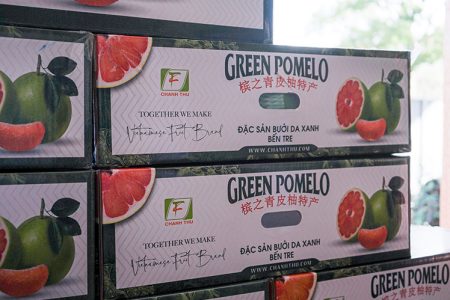‘It’s always exciting to demonstrate the positive impact of air cargo to support new trade initiatives like this,’ says GM Cargo Commercial George Edmunds. ‘We’re delighted to have carried Vietnam’s first pomelos to the US, following on from our facilitation of the trade in star apples and mangoes, and to open a new transpacific trade flow, ensuring this fruit gets to market quickly and in top condition.’
Growing market for tropical fruit
The US’ significant Vietnamese population and East Asian diaspora are fuelling its status as the largest importer of tropical fruit in the world, with US$4bn-worth imported in 2020.
While pomelos are grown throughout Vietnam, the green pomelo from Ben Tre, which has a year-round season, is widely regarded as the best, with its thin peel and sweet reddish-pink flesh. However, conquering new export markets is not quite as simple as picking fruit and loading it on a plane.
Shipper Chánh Thu Fruit Import-Export Group Joint Stock Company has been working on an efficient process to get the citrus fruit ready for the US market for more than five years . Chánh Thu has more than 20 years’ experience in exporting fresh and frozen fruits to 10 export markets, including the US and Australia, which have very stringent import requirements for agricultural and horticultural imports.
Rigorous import requirements
The company’s previous successes include being first to export mangoes and rambutans to the US so the team understands what is needed. Among the many requirements that must be met, Vietnamese pomelo farms and processing facilities must be registered with the Plant Protection Department and the US Animal and Plant Health Quarantine (APHIS), with mandatory inspections and monitoring throughout the year. The farms must also adhere to strict processes around planting, harvesting and handling.
Pomelo packing factories, like Chánh Thu’s 20,000sqm facility, must also have appropriate practices in place to eliminate pests, such as fruit flies and certain types of fungi. In the case of pomelo exports to the US, requirements include the need for the fruit to be irradiated to receive a phytosanitary certificate.




